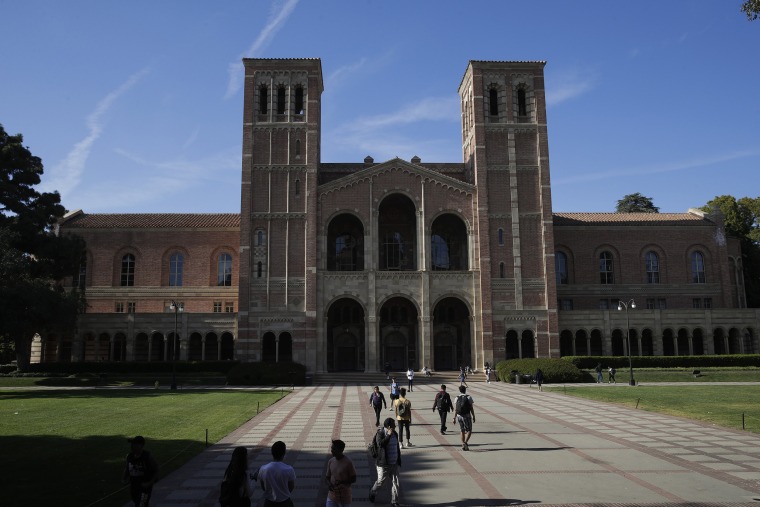Students, educators and advocates are suing the University of California over its use of the SAT and ACT in college admissions decisions, accusing the 10-campus system of discriminating against applicants of color from low-income families by requiring standardized tests.
Supporters of the lawsuit, filed Tuesday in California Superior Court in Alameda County, say it’s the first of its kind and could have a far-reaching impact. While the SAT and ACT have been a standard admission tool in the United States for decades, aiming to offer objective criteria to compare students from different high schools, dozens of higher education institutions have dropped the tests from their admissions criteria amid a growing backlash.
“The results in California will be closely observed in the admissions world,” said Bob Schaeffer, public education director at FairTest, an organization critical of standardized testing.
The SAT and ACT have been blasted by critics who cite research showing that scores are strongly associated with race, family income and student background. One 2015 analysis found that the lowest average SAT scores were among students from families who made less than $20,000 a year, while the highest were among students from families who made more than $200,000. The disparities are driven in part by expensive test prep programs that aren’t available to many students.
The tests’ defenders say they are not discriminatory but rather capture existing disparities in America’s education system.
Critics, though, say it would be fairer for colleges to consider high school grades, letters of recommendations and application essays instead. The California lawsuit argues that using the tests violates the state’s anti-discrimination statute because it puts children of color, children from low-income families and children with disabilities at a disadvantage.
The tests are “flawed,” said Kawika Smith, a Los Angeles high school senior who is the lead plaintiff in the California suit, which includes three other students, six advocacy groups and the Compton school district. “It does not account for my experiences, good and bad.”
Smith, who took the SAT recently and has not received his score yet, said he expected to do poorly based on his low scores on the PSAT and practice tests. He said the numbers do not reflect his ability and the effort he has put into maintaining good grades, as he dealt with hunger and homelessness as a child, as well as the death of his brother last year. Unlike his friends from more affluent families, he could not afford test prep courses that cost thousands of dollars per month.
A test score “doesn't report on how I am working on healing the trauma,” he said.
Without a strong SAT score, Smith thinks he’ll have no chance of gaining admission to coveted schools like UCLA and UC Berkeley, his top choices.
The University of California has been reviewing its use of the SAT and ACT and last year asked a faculty task force to assess the exams’ impact. A spokeswoman said the university is “disappointed” that the students filed suit before the task force could finish its work early next year.
“The University of California has already devoted substantial resources to studying this complex issue,” the spokeswoman, Claire Doan, said in a statement.
Mark Rosenbaum, an attorney with Public Counsel, the pro bono law firm leading the legal effort, said the suit was too urgent to wait.
The SAT and ACT are a “useless metric,” he said. “It is that garbage that is determining the fate of these students.”
“It is known that these tests discriminate based on race,” Rosenbaum added, “and the failure to do anything about it, the stubborn insistence that discriminatory metrics must be part of the college admissions process, that is a smoking gun. It is a smoking gun telling us how deliberate racial discrimination works in the year 2019.”
The College Board, the company that makes that SAT, pushed back strongly against the claim that its test is discriminatory, calling that suggestion “false.”
“Any objective measure of student achievement will shine a light on inequalities in our education system,” Jerome White, a spokesman, said in a statement. The company said it has recently redesigned the exam to “improve college readiness and break down barriers to college” and it makes free personalized practice materials available to all students.
The nonprofit that makes the ACT said it was “committed to expanding access and ensuring fair testing for all students.”
“It is inappropriate to blame admissions testing for inequities in society,” the ACT organization said in a statement. “Differences in test scores expose issues that need to be fixed in our educational system.”
If successful, the suit would only affect admissions at the University of California. But its impact could reach beyond the state’s borders.
“Once the SAT and ACT fall in California,” Rosenbaum said, “I think the rest of the country won’t be far behind.”
CORRECTION (Dec. 13, 2019, 4:55 p.m. ET): An earlier version of this article misstated when Kawika Smith’s brother died. It was last year, not this year.

